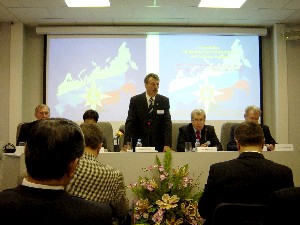Dispatch of Medical Professionals
Home > Dispatch of Medical Professionals > Dispatch List > HICARE Member Dispatch to 10th REMPAN Meeting
HICARE Member Dispatch to 10th REMPAN Meeting
Dispatched Member:
Kenji Kamiya Member of the Board of Directors: HICARE
Director of Hiroshima University Research Institute for Radiation Biology and Medicine
Name of Meeting:
Period of Meeting:
Outline of REMPAN Meeting:
Background of REMPAN Meeting:
In 1986, the Chernobyl nuclear reactor accident affected various countries, afflicting serious health and social damage on the surrounding peoples. Despite that accident however, the opportunities to utilize radiation positively and effectively are increasing in the fields of both medicine and industry. The benefits of radiation technology are becoming essential for our everyday lives.
Thus, despite the low likelihood of exposure, given its prevelence, we must promote radiation emergency medical preparedness. However, the presence of experts at an accident site cannot be guaranteed; the number of radiation experts worldwide is simply insufficient.
WHO, working closely with the International Atomic Energy Agency (IAEA), has been trying to establish a network of experts and a system that allows those experts, all over the world, to cooperate together to treat those exposed to radiation. This network is called the "Radiation Emergency Medical Preparedness and Assistance Network", or REMPAN.
Outline of Meeting:
The objectives of the meeting are:
1) To review the activities of the 28 REMPAN institutions in the past two years
2) To develop a strategy for strengthening REMPAN’s capacity in the event of a radiation accident or terrorist attack
3) To plan future activities of REMPAN regarding response and preparedness, including regular exercises and physician training and certification
4) To discuss a REMPAN exercise to be held within the CONVEX-3 (2005) framework (international exercise on nuclear emergency)
5) To discuss the possibility of telemedicine applications for emergency purposes, coordination of research, and emergency public health actions
6) To review the lessons learned from medical management incidents and recent radiation accidents , and to generally share knowledge
7) To update Safety Report No.2, jointly published by the IAEA-WHO in 1998 on "Diagnosis and treatment of radiation injuries"
Participants:
Experts for radiation emergency medical preparedness from Japan, U.S.A, France, Germany, England, Italy, Australia, Finland, Brazil, Hungary, China, Korea, Russia, Georgia, Argentine, Ukraine and Beralus, in addition to Dr. Margaret Chan, director of WHO, and WHO and IEAE officials, 8 participants from Japan including Dr. Suzuki of Radiation Effects Research Foundation, Dr. Akashi of National Institute of Radiological Science, Dr. Nagataki of Japan Radioisotope Association, Dr. Yamashita of Nagasaki University, and myself.
Present Meeting:
The current REMPAN Meeting started with an address by Dr. Alexey Nikiforov, Director of the All-Russian Centre of Emergency & Radiation Medicine, and meeting chairperson. The Meeting was held for 3 consecutive days.
Active discussions regarding various radiation matters by participants caused frequent extensions of meeting time and reductions of break time. Warm hospitality to participants from all countries involved enhanced their impression of the organization, and heart-to-heart discussions were very much possible.

REMPAN Meeting
Dr. Kamiya's impression:
The active discussion among the experts not only enlightened me but also inspired me towards future activity. Although the probability of radiation accidents is low, each expert seemed to realize that radiaion emergencies, including the terrorist attacks using radioactive materials, are real and may in fact occur.
Hiroshima has accumulated significant medical expertise via its health care for of A-bomb survivors, perhaps the most in the world. I felt that this expertise could greatly contribute to the advancement of medical treatment for the radiation-exposed, given our many advances.
HICARE, in addition to trying to use its knowledge to aid radiation-exposed patients all over the world via the REMPAN Meeting, HICARE is also trying to the learn from the REMPAN meetings in order to improve its training in the future.
I feel that these HICARE exchange activities are very important to proilfereate information gained from Hiroshima’s Atomic bomb experience, although the significance of these meetings may seem obscure to the average viewer. The world holds high hopes for Hiroshima and its significant medical knowledge regarding radiation exposure, and the exchange that takes place at these meetings is of the highest importance.



